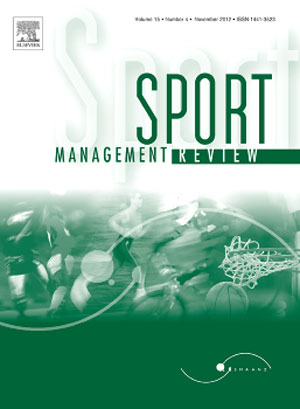 More than a sport and volunteer organisation: Investigating social capital development in a sporting organisation
More than a sport and volunteer organisation: Investigating social capital development in a sporting organisation
Original Research Article, Pages 395-406
S. Darcy, H. Maxwell, M. Edwards, J. Onyx, S. Sherker
- The study examines the development of social capital in a sport and volunteer organisation.
- The research design uses an interpretive qualitative framework.
- The study confirms the development of collective and individual components to social capital.
- Social capital is founded on bonding prior to bridging with other community organisations.
- Human capital is used by individuals for both personal and other community benefits.
Strategic alliances in sport tourism: National sport organisations and sport tour operators
Original Research Article, Pages 407-418
Millicent Kennelly, Kristine Toohey
- We demonstrate how national sport organisations can facilitate development of sport tourism around major sport events.
- Strategic alliances between national sport organisations and sport tour operators can produce mutual benefits.
- Flexible, ‘bottom-up’ strategic alliances with tour operators may allow sport organisations to capitalise on sport tourism.
The development of loyalty among novice and experienced customers of sport and fitness centres
Original Research Article, Pages 419-431
Sevastia Avourdiadou, Nicholas D. Theodorakis
- We examined the effect of service quality and satisfaction on customer loyalty across different consumption stages.
- Data was collected in the context of sports and fitness centres.
- Our results indicated that service quality was a major driver of loyalty only for novice customers.
- Satisfaction was found to be a major driver of customers’ future behaviours for both groups; however, its impact was significantly greater among experienced customers.
Perception of the new competition formats in the Innsbruck 2012 Youth Olympic Games sports programme—A spectators’ perspective
Original Research Article, Pages 432-443
Martin Schnitzer, Sabrina Scheiber, Madeleine Lang, Elisabeth Brandstetter, Martin Kopp
- YOG spectators perceive the level of performance at new competitions as very high.
- Watching an event from start to finish results in an increased entertainment level.
- Spectators’ eustress scores are higher at action-packed events.
- Spectators lack an understanding of the competition rules for new event formats.
- Ski Halfpipe and Snowboard Slopestyle have potential for future development.
Hurdles for sports consumption? The determining factors of household sports expenditures
Original Research Article, Pages 444-454
Erik Thibaut, Steven Vos, Jeroen Scheerder
- The household production theory performs well in explaining sports consumption.
- Two-stage approaches are needed to analyze household sports consumption.
- Higher educated households more often spend money on sports participation.
- Higher educated households do not spend higher amounts of money on sports.
- Other influencing factors are family income and sports club membership.
Understanding fan motivation for interacting on social media
Original Research Article, Pages 455-469
Constantino Stavros, Matthew D. Meng, Kate Westberg, Francis Farrelly
- Contribute to emerging research on the nature of social media use by fans.
- Detail key motives fans exercise from the social media enabled connection to the team.
- Discuss how social media can be used to further facilitate interaction in sport.
- Identify implications for sport managers to further relational goals with fans.
Exploring sport brand development strategies to strengthen consumer involvement with the product – The case of the Australian A-League
Original Research Article, Pages 470-483
Thilo Kunkel, Jason P. Doyle, Daniel C. Funk
- Sport brands can use three general strategies to develop their brand.
- Brand development strategies can be used to influence consumer-based brand associations.
- Leagues need to consider their clubs in their brand development approach.
- Consultation of highly involved consumers also benefits other consumer segments.
When the crowd evaluates soccer players’ market values: Accuracy and evaluation attributes of an online community
Original Research Article, Pages 484-492
Steffen Herm, Hans-Markus Callsen-Bracker, Henning Kreis
- This research describes how an online community with interest in professional soccer evaluates players’ market values.
- The community’s market-value estimates are excellent predictors of actual transfer fees.
- The community evaluations can largely be predicted using an econometric model that contains two blocks of determinants.
- Blocks: measures that are directly related to players’ talent and variables that result from judgments by external sources.
- Organizing variables into these two blocks provides a more differentiated look at the popularity of players.
In support of sport: Examining the relationship between community sport organizations and sponsors
Original Research Article, Pages 493-506
Katie Misener, Alison Doherty
- Scales were developed to measure elements of the relationship process and outcomes.
- Operational competence predicted impact on operations and community presence.
- Operational competence further enhanced the impact of long-standing sponsorships.
- Operational competence was required to a lesser extent than other process elements.
The emergence of a new logic? The theorizing of a new practice in the highly institutionalized context of Swedish voluntary sport
Original Research Article, Pages 507-519
Cecilia Stenling
- Two problems were constructed to legitimize drive-in sport.
- Three principles were prescribed as the ideal way to organize drive-in sport.
- Drive-in sport was legitimized through social constructionist, interpretive processes.
- The theorization was productive of and produces societal ideals, norms, and values.
- Theorization is a necessary precursor to emergence and change in logics.
Understanding the concept of professionalisation in sport management research
Review Article, Pages 520-529
Mathew Dowling, Jonathon Edwards, Marvin Washington
Action sports athletes as entrepreneurs: Female professional wakeboarders, sponsorship, and branding
Case Study, Pages 530-545
Denise L. Parris, Michael L. Troilo, Adrien Bouchet, Jon Welty Peachey
Governance and Policy in Sport Organizations, Third Edition, Mary A. Hums, Joanne C. Maclean. Holcomb Hathaway, Scottsdale, AZ (2013)
Book Review, Pages 546-547
Ian O’Boyle
Sexual Minorities in Sports: Prejudice at Play, M.L. Sartore-Baldwin. Lynne Rienner Publishers Inc., Boulder, CO (2013), ISBN: 978-1-58826-890-7
Book Review, Page 548
Nicole M. LaVoi








